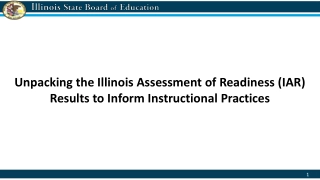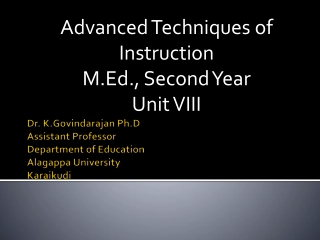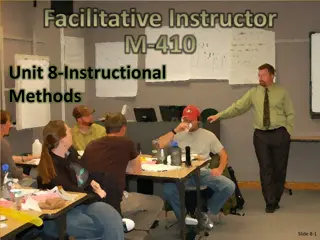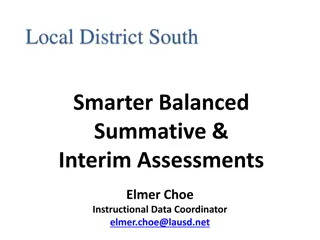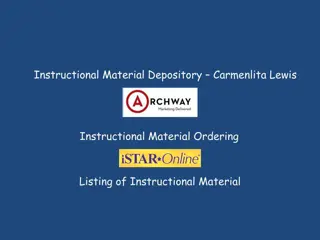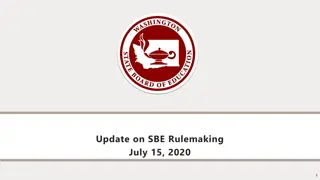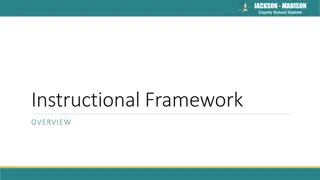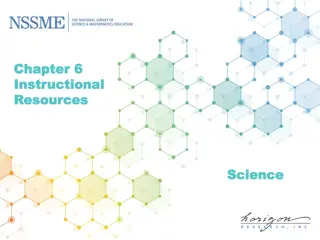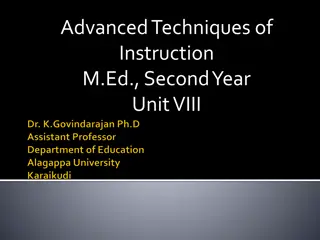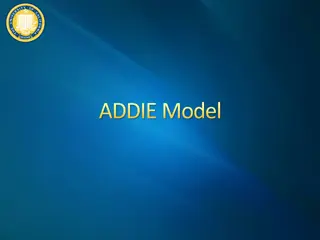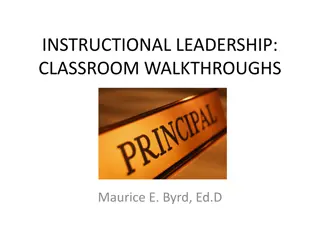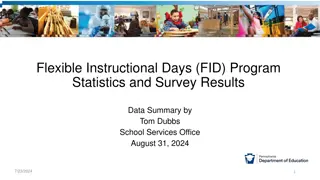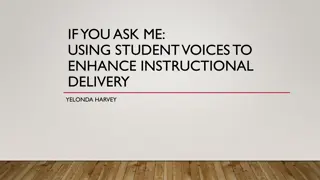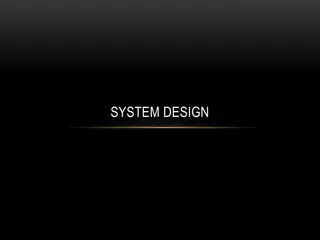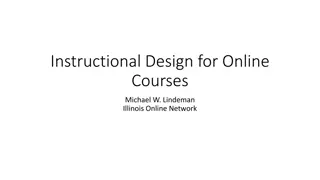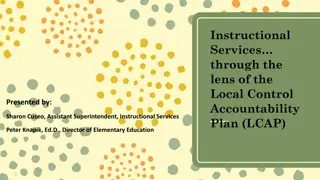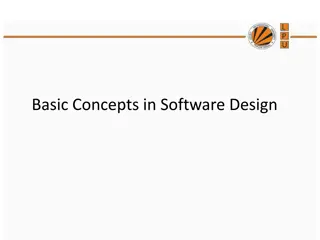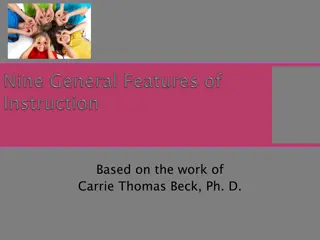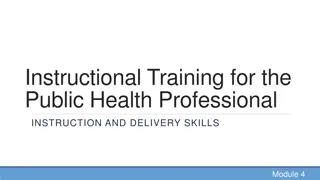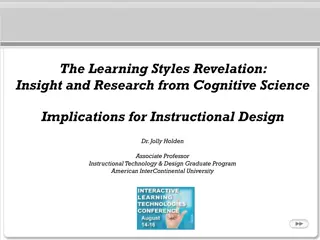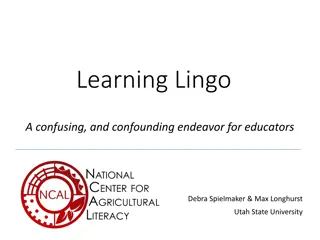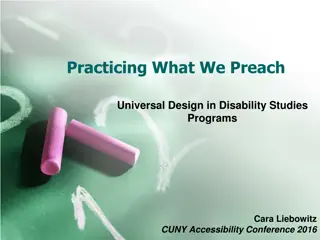Unpacking the Illinois Assessment of Readiness (IAR) Results for Instructional Enhancement
This informative content discusses a workshop aimed at helping district/school teams analyze IAR results to identify trends, enhance instructional practices, and plan for student improvement. Key topics include workshop goals, resources, and the purpose and intended uses of the IAR results.
0 views • 52 slides
Understanding Different Learning Theories and Instructional Approaches
Learning is defined as a lasting change in behavior resulting from experiences. Behaviorism, Cognitivism, and Constructivism are key theories influencing instructional design. Teachers play a crucial role in providing effective learning experiences. Empiricism and Rationalism have historically shape
2 views • 30 slides
Exploring Shared Instructional Leadership in Danish Schools
This study delves into how principals implement shared instructional leadership in Danish primary and lower secondary public schools, aiming to enhance dialogue on its potential in diverse cultural contexts. The Danish educational landscape, emphasizing autonomy and democratic participation, poses c
1 views • 14 slides
Academic Progress Monitoring for Effective Instructional Planning
Academic progress monitoring involves measuring student performance to evaluate responsiveness to interventions, guide instructional decisions, and determine when adjustments are necessary. It helps identify students needing additional support, compare instructional effectiveness, decide on changes,
2 views • 44 slides
Behavior Progress Monitoring for Individualized Instructional Planning
Utilizing behavior progress monitoring allows educators to track student performance over time, make data-informed decisions to improve responsiveness to interventions, and tailor instructional plans for individual students. This comprehensive approach involves steps such as setting the stage, analy
6 views • 52 slides
Effective Instructional Methods for Adult Learners
Explore six effective instructional methods for adult learners, including advantages and limitations of each. Learn how to mitigate behavior problems associated with adult learners. Discover appropriate methods for teaching first aid, FireWise principles, disseminating policy information, and discus
0 views • 13 slides
Understanding SBAC Summative and Interim Assessments for Instructional Decision Making
Resources and insights are provided for interpreting SBAC summative assessment results and using interim assessments to enhance instructional and curricular strategies. Explore California Assessment of Student Performance and Progress (CAASPP) reporting, scaled scores, achievement levels, assessment
0 views • 60 slides
Comprehensive Guide to Instructional Material Depositories and Ordering
Explore a detailed comparison of prices and shipping charges for adopted and non-adopted instructional materials across different school sizes. Get insights into ordering platforms and savings on book depositories tailored for educational institutions.
0 views • 40 slides
Comprehensive Report on Computer Aging and Replacement Plan
This detailed report provides insights into the aging of computers categorized by fiscal years, use type, and cost. It includes statistics on instructional and non-instructional desktops and laptops, accompanied by corresponding cost breakdowns. Additionally, the report outlines the funding mileston
1 views • 8 slides
Update on State Board of Education Rulemaking - July 15, 2020
A comprehensive update on the recent SBE rulemaking activities covering emergency rules, waiver authorities for private schools, instructional hours, high school graduation requirements, mastery-based crediting, and more. The content includes a review of conclusions, agenda discussions, rule timelin
0 views • 12 slides
Jackson-Madison County School System Instructional Framework Overview
In the Jackson-Madison County School System, the focus is on a research-based instructional framework consisting of curriculum, lesson structures, and authentic literacy. Emphasizing the importance of a content-rich curriculum, effective teaching practices, and purposeful literacy, the district aims
0 views • 37 slides
Enhancing Student Engagement in Online and Face-to-Face Learning Environments
Effective teaching involves engaging students in various instructional modes to enhance learning outcomes. This session explores strategies to promote student engagement through interaction, building community, and differentiating instructional methods in both virtual and physical settings.
0 views • 20 slides
Professional Development Workshop Series on Instructional Coaching and Mentorship
Explore the world of instructional coaching and mentorship in education through a series of workshops focusing on deepening coaching practices, self-reflection, key aspects of coaching, and transactional analysis. Led by expert facilitators, participants will develop their coaching skills and foster
1 views • 28 slides
Utilizing Instructional Aids in Teaching Pakistan Studies: Enhancing Learning Through Visual and Audio-Visual Materials
Learning and teaching in Pakistan Studies involve the use of instructional aids such as visual aids, audio aids, and audio-visual aids to enhance the teaching-learning process in schools. These aids help in¡n reinforcing knowledge, stimulating sensory organs, and facilitating quick comprehension fo
0 views • 26 slides
Science Instructional Resources Usage in Elementary and Middle School Classes
Explore the utilization of instructional resources in science classes across elementary and middle schools. The data showcases the distribution of various types of resources such as textbooks, kits/modules, online units, and more designated for educational purposes. Discover the percentage breakdown
0 views • 52 slides
Understanding Learning Theories in Instructional Design
Learning is defined as enduring behavior change resulting from experiences. Behaviorism, Cognitivism, and Constructivism are key theories in instructional design. Teachers must cater to learners' needs for effective behavior changes. Empiricism and rationalism have historically influenced epistemolo
2 views • 30 slides
Software Engineering Design Principles and Concepts
The chapter discusses the essential principles and concepts in software design, highlighting the four key design models - data design, architectural design, interface design, and component-level design. It emphasizes the importance of traceability to the analysis model, minimizing the gap between so
0 views • 36 slides
Understanding the ADDIE Model in Instructional System Development
The ADDIE Model, a common model in curriculum design, consists of five key elements: Analysis, Design, Development, Implementation, and Evaluation. Each stage plays a crucial role in creating effective instructional systems, catering to educational and training environments. Subject Matter Experts,
0 views • 20 slides
Legislative Changes in School Calendar Policies
Significant legislative revisions were made to school calendar statutes in West Virginia during the 2013 legislative session, allowing more flexibility for county boards to develop calendars while ensuring a minimum of 180 instructional days. The changes mandated public hearings, set guidelines for
1 views • 63 slides
Comprehensive Instructional Design & Training Services at CITT Center
Offering a range of services including instructional design, video production, training, and development, the CITT Center provides valuable assistance to educators in creating effective learning experiences. Services cover writing learning objectives, course design, content insertion, and Canvas int
0 views • 14 slides
Enhancing Instructional Leadership Through Classroom Walkthroughs
Effective instructional leadership in schools involves principals taking on roles as instructional leaders through classroom walkthroughs. These walkthroughs help assess teaching strategies, student engagement, and classroom practices, leading to improved learning outcomes. By focusing on key compon
0 views • 7 slides
Writing Effective Instructional Goals and Objectives in Education
Determine the importance of setting clear instructional goals and objectives for effective lesson planning in education. Explore the difference between goals and objectives, understand how to write instructional goals, and learn to create specific, measurable instructional objectives for student ach
0 views • 12 slides
Flexible Instructional Days (FID) Program Overview
The Flexible Instructional Days (FID) Program allows schools to provide remote instruction on days when traditional delivery is not feasible. Schools must apply to the Pennsylvania Department of Education (PDE) to participate in the program, which requires approval by the entity's governing body. FI
0 views • 25 slides
Exploring Design Inspiration and Elements in Costume and Fashion Design
Dive into the world of costume and fashion design through a visual journey of finding design inspiration, understanding the design process, emphasizing originality, and exploring different sources of creativity. Discover how technology, art, food, history, architecture, and nature can spark innovati
0 views • 45 slides
Enhancing Instructional Delivery Through Student Voices: A Study by Yelonda Harvey
Yelonda Harvey conducted a study at a Title I school in Ward 7 to investigate the impact of different instructional strategies on students' academic progress. The research involved administering questionnaires to fifth-grade science students, focusing on student preferences for various teaching moda
0 views • 16 slides
Material Design: Combining Classic Design Principles with Technological Innovation
Material Design is a design language that combines traditional design principles with the possibilities offered by technology and science. It emphasizes visual language, classic design elements, and innovation to create delightful user experiences. The Material Metaphor, Imagery, Typography, Color,
0 views • 34 slides
Comprehensive Guide to System Design Components and Techniques
System design involves the detailed planning and identification of components in an information system, aiming to provide users with a general understanding of the new system. This process includes techniques like flowcharts, prototyping, and component design, covering aspects such as output design,
0 views • 24 slides
Effective Strategies for Online Course Development
Instructional Design for Online Courses by Michael W. Lindeman presents valuable insights into the systematic process of translating learning principles into instructional materials. It covers differences between face-to-face and online course planning, considerations for online course development,
0 views • 27 slides
Overview of Instructional Services through LCAP
Explore how Instructional Services, including Elementary Education, Special Education, Child Development, Instructional Technology, Arts & Career Technical Education, and Induction programs, are structured and evaluated within the context of the Local Control Accountability Plan (LCAP). The organiza
0 views • 38 slides
Understanding Basic Concepts in Software Design
Software design involves transforming customer requirements into a form suitable for implementation, with activities categorized into preliminary and detailed design stages. High-level design focuses on module identification and control relationships, while detailed design entails defining data stru
1 views • 24 slides
Reconsidering the Matching of Texts to Students' Reading Levels
The prevailing belief that instructional materials should be tailored to students' reading levels to enhance learning may not be as effective as commonly thought. Contrary to this idea, evidence suggests that such text placements can hinder rather than facilitate student reading achievement. The his
0 views • 45 slides
Effective Instructional Strategies for Engaging Students
Instructional tasks are modeled appropriately, explicit instruction is provided, and students are engaged in meaningful interactions. Opportunities for practice and corrective feedback are given, while encouraging student effort and success. Demonstrations and step-by-step guidance help students lea
0 views • 58 slides
Understanding Compensation Models for Instructional Employees
Exploring the Whitefish Bay Instructional Employees Compensation Model and its evolution, including changes in salary determination, state budget impacts, and prior compensation adjustments. Discussions on the significance of teacher compensation changes, elements of compensation beyond salary, and
0 views • 27 slides
Instructional Training for Public Health Professionals Module 4
This module focuses on enhancing instructional and delivery skills for public health professionals. Participants will learn to identify factors for effective delivery, recognize positive presentation skills, and describe tools used in instructional settings. Topics covered include instructor aptitud
0 views • 23 slides
Learning Styles and Instructional Design: Debunking Misconceptions
The concept of learning styles as predictors of learning outcomes is widely misunderstood. Research shows little impact on learning outcomes. This presentation explores the implications for instructional design and questions the relevance of considering learning styles as a variable in instructional
0 views • 56 slides
Jackson-Madison County School System Instructional Framework Overview
The Jackson-Madison County School System focuses on engagement through a research-based instructional framework centered on curriculum, lesson structures, and authentic literacy. Emphasizing the importance of a content-rich curriculum and effective teaching practices, the district aims to improve in
0 views • 26 slides
Comprehensive Analysis of Instructional Model and Engagement in a Lesson
This analysis examines the instructional models exhibited by a teacher during a lesson, focusing on engagement and strengths. Recommendations for potential improvements are also discussed. The content includes images and discussions on identifying instructional models, strengths of the lesson, and r
0 views • 6 slides
Task Analysis in Writing: A Diagnostic Feedback Approach
This presentation delves into the importance of task analysis in instructional design, focusing on writing prompts. It emphasizes the need to gather evidence to evaluate the effectiveness of assessments and discusses a method using a Diagnostic Feedback Survey to align with teaching practices. The c
0 views • 8 slides
Understanding Learning Lingo: Curriculum and Models in Education
The content delves into the complexities of learning lingo, exploring terms such as learning theory, curriculum theory, instructional models, strategies, and methods in education. It covers various instructional models like Understanding by Design and Universal Design for Learning, providing insight
0 views • 13 slides
Universal Design in Disability Studies Programs: Bridging Theory and Practice
Explore the concept of Universal Design and its application in Disability Studies programs. Delve into the principles of Universal Instructional Design, challenges in implementation, and a case study of Disability Studies at CUNY SPS. Understand the importance of aligning academic discourse with the
0 views • 8 slides
